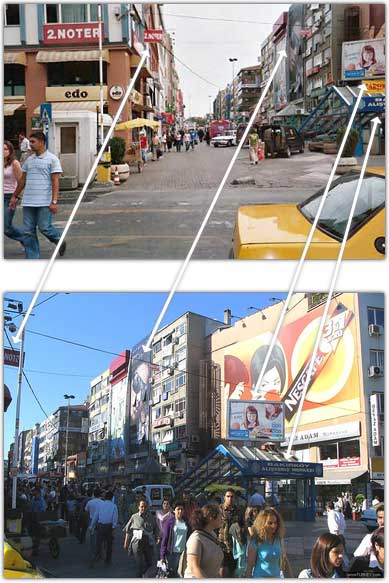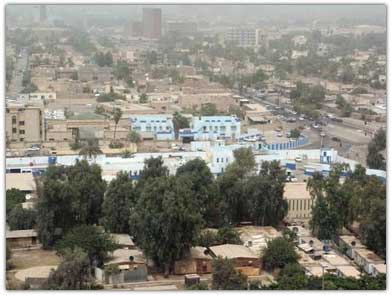March 31, 2006
OurSpace?
Loads happening in MySpace land this week. Well there are loads happening every week there, what's interesting this week is actually what's happening at that intense spot where MySpace, politics and media meet.
The good first. What's been happening in California where MySpace is being used to organize massive student protests is I think quite remarkable. We are talking about an incredible political emergence of a highly marginalized group, and it's being lead by high schoolers. That is empowerment, that's the internet dream of the network routing around obstruction. I'm a little concerned with what the half life of the movement might be, but I'm 3000 miles away so all I can really do is watch it all unfold.
But then as the Space giveth the Space taketh away. And in this case it shut down "200,000 'objectionable' profiles". Those inner quotes by the way are from the Financial Times, just what objectionable contains clearly is an open question of sorts. Now in this spamified age a web site shutting down some accounts is hardly a new thing. But few if any sites have accounts that their users invests so much in as MySpace. If danah boyd is right that MySpace is now an important place for teenagers to formulate and discover their identities, and do believe she is right, well then we now have to face the fact that those identities are now owned by News Corp and News Corp has the ability to delete teenagers identities as they see fit.
Now having your MySpace profile deleted is hardly the end of the world. The intensely network nature of MySpace does mean that it's exponentially harder to rebuild a developed profile than say starting a new WoW character, but in the end it probably only takes a weekend to reconstruct an extensive MySpace profile. However if you've ever been a teenager, and I really hope most of my readers have been, well you might remember that not every teenager had the best perspective on what the end of the world might be. Just how much of a threat is having your MySpace page deleted? It's a pretty tricky question to answer and from that Financial Times piece it's something MySpace management has thought a lot about.
“MySpace is more potent and powerful than even we knew,” Mr Chernin [president and chief operating officer of News Corp] says. “And it is becoming a more integrated part of people’s lives.” However, as efforts grow to attract more advertisers to the site, News Corp is facing two challenges. Young users have to keep wanting to use the site, rather than switch to a “cooler” alternative.
Also, advertisers have to feel confident their reputation will not be tainted by “inappropriate” content.
I'd have to add into there that News Corp answers not only to it's advertisers and users but to it's own political agenda as well. Unless it flames out into a mass exodus odds are some sort of dynamic psuedo-equillibrium is going to form between those forces. And just how that psuedo-equillibrium is constituted is going to have a huge impact on what happens in MySpace. Is it a wide open commons for kids to express themselves however they see fit. Or is it a regulatory environment, one where they can express themselves only within a particular set of boundaries set my New Corp execs? And since the later seems almost a given now, perhaps it better to ask just how regulated will it be? Is it just deleting spam, or is it deleting messages that go against News Corps favorite politicians? Deleting trolls or deleting pro-ana profiles?
Man I sort of hate to bring Deleuze into this, particularly my least favorite essay of his, but really I can't think of any better way to end this than a link to "Society of Control"....
March 30, 2006
State of the Planet 2006
The State of the Planet 2006 conference probably would be better named the "state of the toothless left-center UN bureaucrat and their friends 2006 conference" but hey it's the internet age so economists and scientist don't really need to tell the truth anymore do they? And well, truth be told I actually rather enjoyed the two days. For one knowing how these people think is actually rather useful, and hey as a bonus every couple hours or so one or two of them would actually say something interesting. That's an exaggeration of course, but they did actually pull two people out at the end that well made up for the wait.
Parker Mitchell of Engineers Without Borders took the tried and true engineering route towards relevance, actually doing something in the real world. But unlike all to many engineers he has also realized that when actually doing something means trying to solve hunger in African droughts you actually need to take culture into account. You can't just march in and say "here is a new toy, destroy your customs and it'll save you". Maybe it sounds nasty, but in many ways it takes cultural engineering. You need to win trust and you need to convince people to take a huge risk on trying something new. And when you are talking subsistence farmers, remember that if they try something new and get back less than they need to eat.. well they either beg or die or both. Maybe he had the nastiest message of the conference, if we want to do things we need to go every individual problem and listen. It's way more work than say the number juggling so many presenters powerpointed to the screens, but in the end I found it profoundly uplifting. It's long and slow and absurd amounts of work, but at least someone is doing it.
As much as I may talk about pragmatism and actually doing things though in the end I'm still under the spell of big ideas and Johan Rockström was really the only one to deliver on that front. Like many big ideas it's ridiculously simple once you learn it, this one is so simple it was in my forth grade science textbooks, but apparently in never made it up the land of international aid and planning. Rockström is all about green water. Green water is that stuff you see in a basic diagram of water circulation, the stuff that evaporates back into the air and the stuff that gets sucked up into plant roots and rhizomes. In other words the water that lets our planet breathe. But people concerned with water crises apparently don't care about green water, they care about blue water, essentially the water that turns into streams, lakes and rivers. This is what we drink, irrigate fields with and dump all our shit back into. It's important but it's also only a small part of our waterflows. Rockström's point was exceedingly simple, we can't solve water problems without factoring in green water as well as blue. Simple, to the core and straight out of elementary school, it's sort of sad this is revolutionary, but hey in these times I'll take it where I can get it!
Visual Emergence
Maybe it's because I'm a designer, but there is something about one of the stories that unfolds in this weeks Talking Points Memo that just flips my head a bit. It starts off rather innocuously, a republican candidate posts this photo, claiming it is of Baghdad and that things over there are not nearly as bad as the media is making them out to be.

So far so whatever, left wing blogger and bulletin board people start pulling it apart, is it really Baghdad? To many latin letters not enough arabic, girl is wearing a tank top, holding hands, weird ads, something is funny, something is boring, politics as usual, collective journalism, smart mobs, yawn, we've heard this story before haven't we?
But then. Well here is where my brain skips a beat, someone, don't ask me how, digs up another photo. Not the same photo this isn't some blasé plagiarism story, but a different photo, from a different source of the exact same intersection in question. A random photo off some random website. And it turns out that intersection, that street scene is, surprise surprise, some random suburb of Istanbul. Here are the two photos, with Josh Marshall's annotations:

And I'll admit it the whole thing just boggles my mind. How many intersections are there in the middle east? How many photo web sites? How many photos? This isn't some famous square, it's some random street, how in the world did someone, or some-collective-thing, dig that up in a day? Maybe it's random, or maybe it's a precursor, lets see. In any case this particular story has one last twist, fittingly visual. So the politician got caught, claims a staffer made a mistake, lets move on right? So here is the real photo he just posted, you know the one that shows just how safe the Iraqi streets are and just how the media is lying to us:

What more can I say, lets all move to Baghdad, the streets are safer than DC and for one the media has been driving real estate prices down instead of up...
March 26, 2006
The Internets of Things
People are making tiny computers and sticking them in everything, this much is pretty clear. So is the fact these things are starting to talk to each other. Just what to call these everythings though is a whole other story, but from the rather sub-academic linguistic mess comes one compelling figure of phrase, the internet of things. And well this is the internet and this is a blog, so let me just do my duty and add my own iteration to the word slop and suggest we need to get a bit more Dubya Bush on that phrase and start talking instead about the the internets of things.
The world may have laughed painfully when George Bush started talking about the internets, but the very fact that we can talk about the internet in the singular is a rather remarkable historical fact. A fact of protocol. Whether or not that the wireless objects increasingly percolating around us will all talk the same language, speak the same protocol, is in geek terminology a non-trivial problem. That is to say it is a resolutely political issue, and one with ramifications that could well effect us all.
Who writes the protocol(s) for the internet(s) of things. I first asked that question over in the comments on Adam Greenfield's v-2.org. An quite accurate and rather dismissive response came in from internet of things coiner Bruce Sterling: "Geeks are writing the protocol. Geeks are the class of people who write protocols." Which is sort of like saying "monks are the people who write books" back in 1300. Completely accurate and completely irrelevant to the issues of the future. We quite likely are a generation and change away from a world where being able to write code is as second grade as being able read and write. Now of course writing protocol is a rather special class of programing, the same way say writing novels or legal statues is a specialized class of writing. But that just begs the question, are the protocol(s) of the internet(s) or things getting written by the lawyers or novelists? And if it's both and more as it may well be well you can kiss that internet singular goodbye.
The unity of the internet comes two protocols embedded in the five letters of TCP/IP. We'll save you the details and histories and just say that that birthing process occurred in a rarefied embryonic stage of networked cultured. So rarefied that a surprising percentage of the main players went to the same California high school. More importantly perhaps though, it was only through luck and a naive disinterest that institutions like AT&T, Xerox and the US Department of Defense never sunk their claws into the processes going on in their nether regions. You can bet that the NSAs, Sonys, Microsofts, Nokias and Deutsche Telekoms of the now are not going to let similar opportunities to mar the protocols of tomorrow slip past unmolested.
Yes the geeks are writing the protocol today, but which geeks? The Chinese government geeks? the Redmond option whore geeks? Russian mafia geeks? American dwarf linux geeks? Sony DRM geeks? favela internet cafe geeks? If its an internet of things than only one can really win. If multiplication prevails we have not an internet, but internets of things. And the difference between the two is quite literally of Tower of Babel proportions. Are these things in this together or do they take sides in the networks around us?
March 21, 2006
TheirSpace
Friendster lost steam. Is MySpace just a fad? is danah boyd's latest essay on the big social network sites, and her continued defense of MySpace against rising media driven fears. I'm pretty much in agreement with her on the level she has framed her argument, as the freedom of users to create their space versus the attempts of managers and concern parents to control it. Yet something big is missing from that story, something about MySpace being created by an internet marketing company know for spam, adware and spywear. Something about it being bought for a rather large sum by news corporation known for pursuing power first and profits second.
Through out her writing danah constantly invokes a bottom up defense of youth culture. Essentially that the kids are alright they just need space and privacy to develop their own identities. It's an argument I'm totally sympathetic to, but it becomes completely problematic when one realizes that something like MySpace just isn't a traditional bottom-up youth culture situation at all. Rather it's something more like an engine, a structure to contain the bottom up energy and transform it into something else entirely.
Now that probably comes off as rather critical, yet it actually purposefully devoid of value judgments. If all MySpace is doing is giving kids a place to be themselves on line and transforming that into ad revenue its a rather benign operation in my book. But is selling ads the only reason for MySpace as a company? Is it the only reason News Corp was willing to pay many hundreds of millions for the service? Without inside knowledge it's difficult to answer, but it is an undeniable fact that the MySpace database is filled with a massive, perhaps unprecedented, amount of demographic data.
MySpace knows their users basic info, name, email, age, etc. Then it also knows their friends, their friends data, their favorite bands, the way they speak, who they like, who they don't. Heck it can probably run a simple algorithm and figure out your favorite words (assuming you use MySpace). A more complex algorithm and it can probably imitate they way you talk.
Not only does MySpace have an absurd amount of personal data on people, the sort of stuff traditional demographics companies have been collecting for decades. But it also has something perhaps far more valuable, a wealth of data on the relationships between all those people. And just what emerges from those relationships remains to be seen. We can speculate a little though.
Imagine a new friend request, good looking person, same style, likes the same books and movies you do, never met them but sure you say yes. Something maybe a touch off, a touch cold, robotic maybe. But they are in your network, in the conversation churn. But slowly they push in odd ways, push certain products, certain activities, push for more info. The future of marketing just might read the same zines as you, buy the same punk 7" as you, watch the same YouTube as you. Perhaps they might even know just what you'll buy better than you.
That's just a scenario, imagine another one. One where it's not about the personal touch, but instead the bigger picture. Youth culture has always relied on reality moving faster on the ground than it does in the board rooms. The ability for kids to find and build their own worlds outside of the ones filled with parents teachers and cops. But what happens if MySpace can see trends faster in their data than kids can actually see them on the ground?
Just a scenario, but remember it might be my space and your space, but it's their data in the end...
March 14, 2006
Power 2.0
Most tellingly, the company [News Corp] spent $400m on MySpace.com, the social networking phenomenon that has proved hugely popular with 35m regular users on both sides of the Atlantic. Mr Murdoch has undergone a Damascene conversion, admitting he hugely underestimated the power of the web. He said last night: "It is a creative, destructive technology that is still in its infancy, yet breaking and remaking everything in its path. We are all on a journey, not just the privileged few, and technology will take us to a destination that is defined by the limits of our creativity, our confidence and our courage."
- Guardian Unlimited | Internet means end for media barons, says Murdoch
So, as Squash points out, Rupert Murdock is now chugging hard at the Web 2.0 Kool Aid. In fact he's even managing to sound even more like a dot.com flashback victim than even the hardiest of the 2.0 players. Yet nothing at all illustrates shocking inequalities of the "long tail" than that $400 million that Murdock dropped on MySpace. In the old model a media company had thousands of paid employees, journalists, anchors, video editors, printers, delivery guys, all there just to get the content made and to the audience. Now the same company, has millions of "users" doing the creation and distribution work for free. Is that empowering the little guy, or is that empowering Mr. Murdock and co's bank accounts?
March 08, 2006
Total Information Incorporation
Australia's The Monthly has one of the best summations of what could be called the reactionary case against Google, in the form of Gideon Haigh's Information Idol: How Google is Making Us Stupid (application/pdf Object via intermaweb).
How does one respond to this sort of thing? In all honesty I just stumble, the target is dead on, but the logic is so wrong. It always pains me to read something that so effectively points out just damn conservative so many on the left still are. Google's rapid rise towards total information incorporation is certainly one of the biggest challenges of the now, but is the way forward to run back to libraries? I certainly can't say I have much of an answer, but maybe one could start by thinking about what a public Google might be? Till then I'm just going to marvel at the irony of how this article that defends libraries so hard managed to use as it's one image a library that illustrates Bentham/Foucault's panopticon as well as any prison I've ever seen...

March 04, 2006
Big World
For a couple years now I've had an unfinished post, pretty much the only unfinished post I actually remember and think about, tentatively titled "six degrees of bullshit". I never finished it cause I could never figure out anything positive to work into it. The whole idea of "six degrees of separation", at the present at least, is one big urban myth. I've never found any compelling evidence for it's existence at all, but all that was left to write then was an attack. It never quite seemed fit to post.
Today something positive happened, I stumbled across Could It Be A Big World After All?(via Clay Shirky's del.icio.us), and now I can just use a link to someone else's work to do the criticism! It even includes a helpful section on why people are psychologically attached to the small world idea.
That article in addition is far more interesting then whatever I could have written, revolving around original work in digging through Stanley Milgram's archives of documentation. My own concern was mainly with the small worlds project and the strange discord between the media hype it generated about "proving" the six degrees thesis while it's actual main result was a massive collection of unfinished chains, proving, like Milgram, only that it's still really hard to map these social networks out...
The real positive though is in the branding, and as is often the case the answer was too obvious for me to see on my own. I'm not out attacking the six degrees/small worlds concept you see, I'm just pro big world theory. Nothing wrong with that is there?
